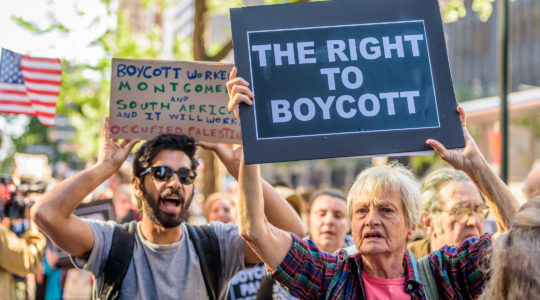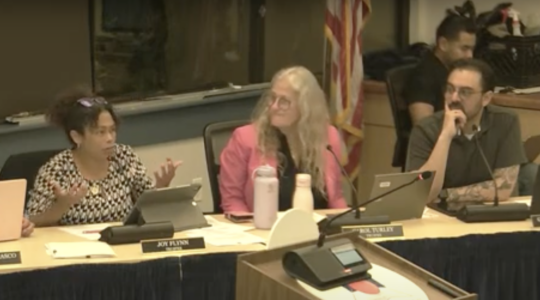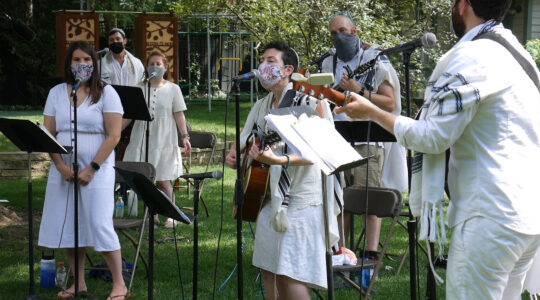NEW YORK (JTA) — It’s being billed as the “Conversation of the Century.”
When the main synagogue organization of Conservative Jewry gathers this weekend in Baltimore to celebrate its centennial, there will be a lot to talk about.
The number of synagogues affiliated with the group, the United Synagogue of Conservative Judaism, is in decline. The proportion of American Jews who identify as Conservative has shrunk to 18 percent, according to the recent Pew Research Center study of U.S. Jewry, down from 43 percent in 1990 and 33 percent in 2000. And with a median age of 55, Conservative Jews are older on average than Reform or Orthodox and more likely to leave their movement than Jews from either of the other two major denominations.
At this moment of challenge for Conservative Judaism, the movement’s leaders have a message for the biennial conference: We’re ready to change.
With a conference program markedly more diverse than past years, United Synagogue is promoting the idea that it’s not just embracing change — the need for change has been a constant refrain within the movement for at least a decade — but that the conference is a place for figuring out how to retool Conservative Judaism for the 21st century.
“It’s not just coming and talking for the sake of talking,” said Rabbi Steven Wernick, the CEO of United Synagogue. “It’s about coming up with ideas and strategies people can take back to their own communities or to their personal lives.
“This convention is an opportunity to pull all those people together who care about the future of an egalitarian, pluralistic and traditional approach to Jewish life, to learn from each other, to be inspired from each other, to come up with new strategies and ideas, and also to have a whole lot of fun.”
On the table is everything from how the movement should treat same-sex couples to how synagogues can be revamped to focus more on what people want. The Shabbat preceding the conference will feature five different prayer services simultaneously ranging from a contemporary-style service with instrumental music to a non-egalitarian minyan featuring the tunes of the late Orthodox spiritualist Shlomo Carlebach. Some of the presenters and entertainers at the conference are Orthodox.
More than 1,100 people have registered, including more than 100 clergy, according to organizers. That’s a sharp rise from recent biennials, which have drawn about 400.
“A number of elements of this conference reflect that the leadership of the Conservative movement is really aware of what’s going on and is really willing to be challenged to find ways to address it,” said Rabbi Sharon Brous, a graduate of the movement’s Jewish Theological Seminary who leads IKAR, an egalitarian community in Los Angeles unaffiliated with United Synagogue. “There’s a deliberate attempt to incorporate voices from the community that have been more marginal.”
One of the vexing problems for the Conservative movement is the flight of its most promising young leaders away from formal affiliation with the movement. Brous and fellow JTS graduate Rabbi Shai Held, co-founder and dean of Mechon Hadar, an egalitarian yeshiva in New York that also does not affiliate, both were asked to present at the conference. (Brous said she declined due to a scheduling conflict.)
The invitations to Brous and Held are about more than just opening up the conversation. They are part of a larger strategy by Conservative leaders to co-opt the successful congregations, institutions and communities started by JTS graduates that have shunned the Conservative label.
Both Wernick and Arnie Eisen, the chancellor of JTS, said the important thing is not whether such groups identify as Conservative, but whether they promote the kind of Judaism espoused by the movement. If they do, they’re Conservative — whether they admit it or not.
“If good things are happening out there and they are fully in accord with what JTS wants to happen, and they’re nearly identical to Conservative Judaism and they don’t fly the flag of Conservative Judaism, I’m very happy with that,” Eisen told JTA.
Wernick stressed the same point.
“I don’t think that affiliation with the movement is really the key,” Wernick said. “The movement only exists in order to perpetuate a worldview of Jewish life.”
That approach gives Conservative leaders an alternative to the narrative of decline in movement institutions, particularly United Synagogue.
Several years ago, a group of renegade synagogues refused to pay their United Synagogue dues, saying they were not getting anything in return. In January, JTA reported that United Synagogue ran a cumulative budget deficit of nearly $6 million over the previous two years.
Along with the drop in the number of member synagogues, the number of Solomon Schechter day schools has fallen sharply. And in June, United Synagogue announced that it was shutting down Koach, the movement’s college outreach organization.
In Wernick’s view, the decline in the number of formally affiliated Conservative synagogues is besides the point; popular egalitarian minyans like L.A.’s IKAR and Manhattan’s Kehilat Hadar ought to count, too.
In an interview with JTA, Wernick would not put a figure on the number of United Synagogue member synagogues.
“That’s a conversation I’m not having anymore,” he said.
A spokeswoman later said the number is about 630.
Held of Mechon Hadar says the open-minded line touted by conference organizers is a good start, but the question is how far the movement is willing to take the conversation.
Would Conservative Judaism be better off without United Synagogue, Held asked, with member congregations having the freedom to redirect the $30,000 or so they pay in annual dues toward investing in family education?
“There’s two urgent questions here: One is the future of Conservative Judaism, and the second, which is not entirely overlapping, is the struggle of United Synagogue for continued relevance,” Held said. “From my conversations with rabbis in the field, there is a lot of skepticism out there.”
JTA has documented Jewish history in real-time for over a century. Keep our journalism strong by joining us in supporting independent, award-winning reporting.






